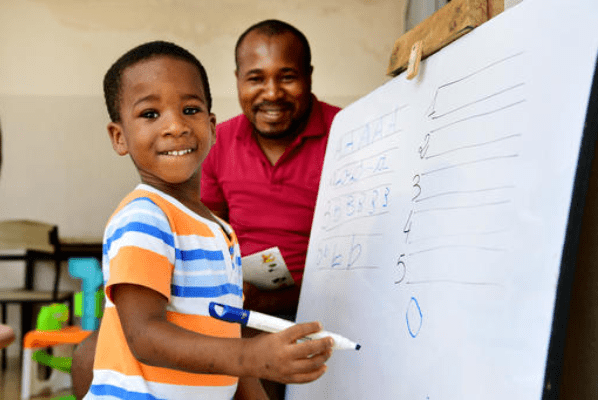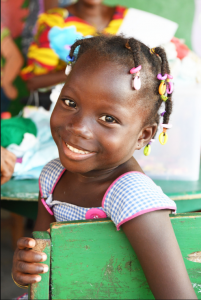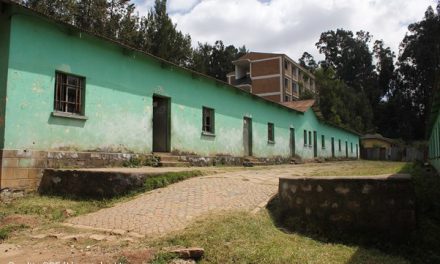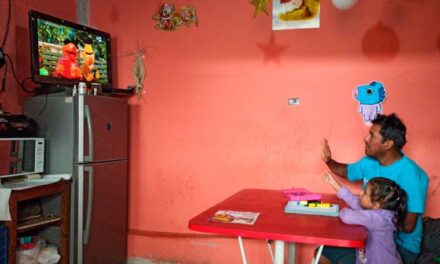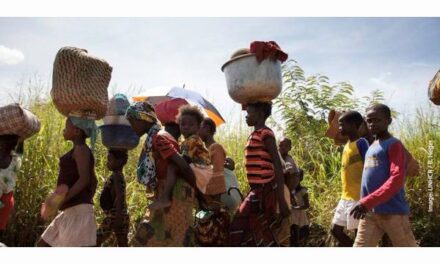This article is written by Lynette Okengo, executive director of the African Early Childhood Network; Robert Jenkins, associate director of education for UNICEF; and Justin W. van Fleet, president of Theirworld and executive director of the Global Business Coalition for Education. It was written for and originally published on the Inter-agency Network for Education in Emergencies (INEE) blog site on 11 June 2020.This article is part of a collection of blog posts related to the education in emergencies response to COVID-19.
Quality ECE fosters stronger links with families and communities while setting young children on the path to lifelong success.
A lot can change in one year. In 2019, UNICEF launched its first-ever global report on pre-primary education, A World Ready to Learn; Theirworld released its report, Leaving the Youngest Behind; and for the first time ever, early childhood education (ECE) was included on the agenda, declaration, and action plan of the influential Tokyo International Conference of African Development in an effort spearheaded by the African Early Childhood Network (AfECN). Since that time, the world has drastically changed for young children and their families as they grapple with the new realities of physical distancing and home confinement brought on by the COVID-19 pandemic. Schools may be closed but brain development cannot be paused, particularly for preschoolers (ages 3–6) whose brains are 90% developed by the time they enter primary school.
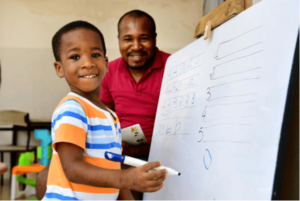 In times of crises, these children and their families need support to ensure continuous learning, so their development remains on track. There are some good examples from across the globe about how the youngest children are still learning during the crisis:
In times of crises, these children and their families need support to ensure continuous learning, so their development remains on track. There are some good examples from across the globe about how the youngest children are still learning during the crisis:
- In China, parents are receiving real-time advice and tips through social media on supporting ECE at home including social and emotional learning (SEL).
- In Zimbabwe, printed materials are being made available to pre-primary aged children.
- In Mongolia, TV is being used to keep pre-primary aged children learning, including in languages children understand, complemented with printed material.
Yet, despite some countries making concrete efforts to support preschoolers and their families, the ECE sub-sector remains largely absent from education responses to the pandemic, at national, regional, and global levels. This disappointingly overlooks the alarming findings from the UNICEF and Theirworld reports highlighting the worrying trend of lack of attention and funding to ECE, despite promises and calls to action. We cannot continue to leave preschool-aged children and their families, especially the most vulnerable ones, in the margins. It is now more critical than ever to reinstate the value and priority status of quality ECE. We must build on prior efforts to advance results for ECE — by leveraging the newfound attention and engagement of families who are now supporting their young children’s learning at home, as well as the innovative ideas that have recently emerged to reach all children with early learning opportunities.
At the start of the decade for action, we can only be on track for the 2030 goals if every single child receives a quality ECE experience today. There are four practical ways in which governments, development actors, civil society groups, and community leaders can support ECE even during the unprecedented time we’re in.
- Ensure ECE is included in the national education response: This means supporting families on quality learning and play at home. At the same time, it means supporting targeted outreach — through a qualified ECE workforce — to high-risk communities, including the poorest families, children with disabilities, refugees and migrants, and others who cannot equally benefit from technology-based home learning. The focus should be on innovative ways to bring quality early learning experiences into the home setting, as well as support to caregivers in this process.
- Ensure ECE is integrated in school reopening plans: Whilst the COVID-19 pandemic presents many challenges, it also offers an opportunity to build back better education systems with quality ECE as the foundation. Caregivers have been the first responders to this crisis, solely responsible for their children’s wellbeing, learning and safety. With schools reopening, there will be an opportunity to capitalize on this stronger engagement by caregivers in their children’s learning. This means proactively engaging with communities for reenrollment of children in early learning programmes; scaling up psychosocial services for young children to address transitions back to care and preschool; strengthening water, sanitation, and hygiene (WASH) services at the school level; and ensuring improved hand washing behavior, food hygiene, and safe drinking water.
- Allocate adequate resources to early childhood and spend those resources on actions that will enable an effective ECE response now and in the longer term: Globally, an average of 6.6% of domestic education budgets are allocated to ECE; fewer than 1% of development aid budgets to education are allocated to this important sub-sector. A global consensus is emerging for at least 10% of education budgets to be spent on ECE, with organizations like UNICEF already having made the commitment to increase its own spending to that level. It is important for these resources to be allocated in a way that strengthens the education system and enables quality provision of ECE, with priorities for investment in early childhood workforce development, curriculum implementation, quality assurance, family and community engagement. We’d do well to learn lessons from the universal scale-up of primary education, where access was expanded rapidly without commensurate resources being invested in quality. We encourage all multilateral agencies, including development banks and the Global Partnership for Education, as well as bilateral donors, to commit to this most basic level of funding for ECE.
- Strengthen partnerships across governments, the donor community, private sector, local communities, civil society organizations, and academia: This will be essential to ensure the rapid scale-up of ECE services to the most vulnerable populations and adherence to guidelines within communities and learning institutions to ensure young children are kept safe and healthy. Strong partnerships will also play a key role in driving the behavior change necessary to slow down the spread of the virus within learning environments as well as mitigate against the unintended effects — such as domestic violence and child abuse — of viral transmission containment measures.
Neglecting ECE at this time would be a mistake with long-term ramifications. It’s time to turn the COVID-19 crisis into an opportunity to build stronger links with families and set more young children on the right path for learning and lifelong success.

